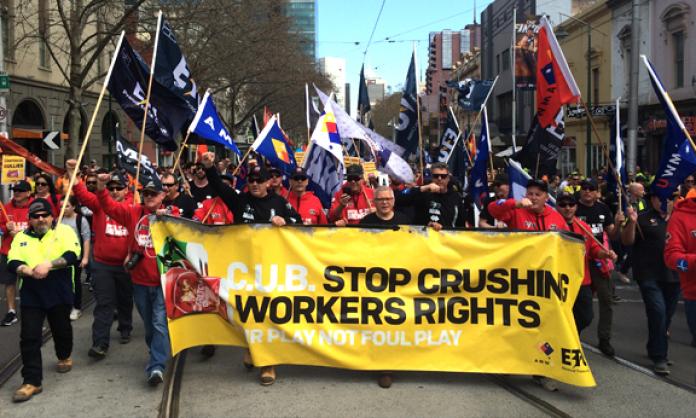“The whole experience is degrading.” Tom (not his real name) works for labour hire companies. He’s been doing it in the manufacturing industry for more than 19 years.
“Nut-and-bolt-blokes” like Tom – those employed to carry out temporary, high-risk work on unfamiliar machinery – often experience unpredictable hours, fluctuating rates of pay, and inferior rights and entitlements compared to permanent workers. Outsourcing arrangements ensure that unfair dismissal and compensation laws can be easily circumvented by bosses, and it is more difficult for labour hire workers to engage in protected industrial action with those they work alongside.
Precarious employment has always existed under capitalism. But outsourcing the labour of skilled tradespeople didn’t develop until later in the 20th century.
Manufacturing has been one of the sectors most affected by the change. A 2005 Australian Manufacturing Workers' Union submission to a federal government inquiry cited figures showing that almost 20 percent of the total labour hire workforce is employed in manufacturing.
In the past, nut-and-bolt-blokes were primarily engaged for short periods. In a 1998 survey of labour hire companies, the now defunct Australian National Training Authority found that more than 80 percent of labour hire contracts had a span of three weeks or less. But employer demand and the decline of union strength have resulted in labour hire workers increasingly being employed for longer periods as previously in-house jobs are permanently outsourced.
According to the AMWU, labour hire workers then become the “flotsam and jetsam” in underbidding wars between outsourcing companies trying to secure contracts. If one firm loses the contract, its workers are out in the cold or, if they’re lucky, perhaps invited to apply again for another “placement” through the new labour hire company.
“It’s a tool the bosses have used to fragment our wages and conditions”, Tom says. Despite being caricatured as unskilled labourers, nut-and-bolt-blokes are often qualified tradesmen capable of performing many of the tasks that the on-site tradies are employed to carry out.
“Labour hire can be brought in to divide a site between one set of qualifications and a lower set”, he says. “Eventually, they’ll roll the whole site back to the lower set of qualifications and pay everyone on site at a lower rate. It’s also a tool the bosses have used to outsource health and safety responsibilities.”
The labour hire contract makes the connection between worker and “host” employer indirectly, so responsibility for workplace safety and liability for accidents is not clear. In many cases, labour hire companies have been used by “host” employers to avoid legal responsibility for workplace deaths.
“I’ve seen one guy fall 13 metres from a crane and hit the deck”, Tom says, referring to an incident at the Smorgon Steel Mill in Laverton. “That night, he died in his sleep from internal bleeding. It wasn’t recorded as an on-site death because he was employed through labour hire. The company gets away with a clean safety record. And because labour hire companies pay their own insurance, all they cop is a fine from WorkCover.”
Labour hire is “a tool the bosses are using to break our unions”, he says. Nowhere is this more evident than the site where Tom has worked for the past 18 months as a maintenance fitter, the Carlton United Brewery in Abbotsford.
In 2009, CUB sacked its brewery maintenance workforce and re-employed them through labour hire contractor ABB. “We lost a lot of our hard won conditions when they hammered us with that agreement”, explains Sam, a maintenance fitter and AMWU delegate who has worked at CUB for more than 30 years.
“In the 1920s, workers won the Christmas bonus – four weeks bonus pay at the end of the year. We used to get a slab of beer with our pay packet at the end of the week. When they put us onto labour hire – all of that went.”
Thirteen weeks ago, Tom, Sam and 53 other unionised maintenance workers were told that ABB was being replaced with a new labour hire contractor, Programmed.
Programmed brought in its own enterprise agreement – one which had been signed by three casual workers in Perth two years earlier – and replaced the one that workers had negotiated with ABB. The Programmed agreement delivered a 65 percent pay cut and the removal of what remained of their employment protections.
“Our previous agreement had clauses that ensured any nut-and-bolt-blokes brought onto a site had to be paid the same rate as us”, says Chris, one of the sacked machine specialists at CUB and an AMWU delegate. “But the new one removes all of those protections and leaves skilled tradesmen open to a hammering.”
For more than 13 weeks, these workers have been protesting to get their jobs back on their old wages and conditions. An ongoing protest camp outside the brewery gates – combined with weekly rallies and a three-hour stop work that shut the brewery down a couple of weeks ago – has now forced Programmed to pull out of its contract with CUB. The 55 workers haven’t been offered their jobs back.
On 8 September, thousands marched through Melbourne’s CBD to demand the workers be reinstated and for an inquiry into the use of labour hire in Australia.
“I’ve never been a particularly hardened union man”, Tom says. “But seeing companies use and abuse workers in this way has cemented my beliefs: you need fighting unions to stand up and protect workers from the sort of hammering we’ve been receiving.”











